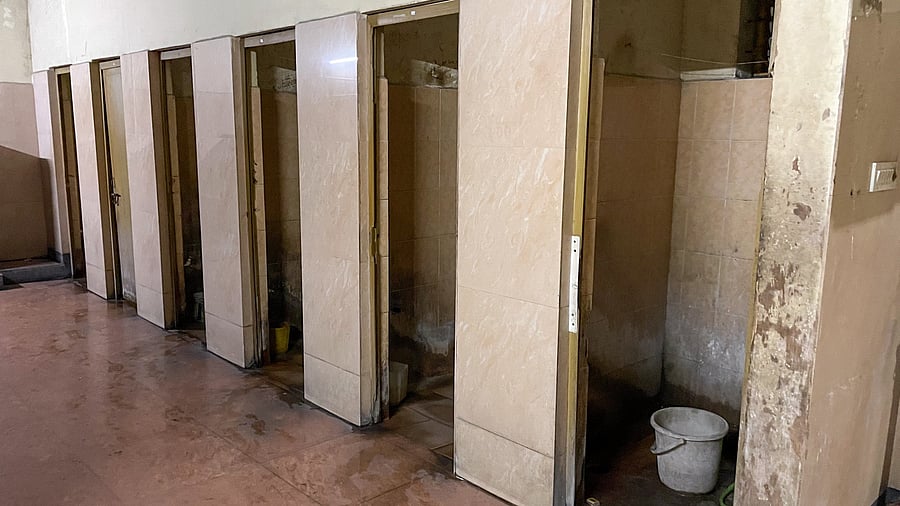
Public toilets
Credit: DH PHOTO/Pushkar V
Over the past few years, I have travelled widely across the country for various reasons—work, leisure, a break from routine, and more.
In India, as we know, an essential part of travel and tourism is shopping—buying an assortment of things unique to each place.
Sometime back, when I travelled to Delhi, a city where I had earlier spent many years as a university student, I visited Connaught Place, a busy commercial zone, popular with locals and tourists alike. On this trip, I also went further north up to Mussoorie, nestled in the Himalayan ranges. In Mussoorie, I walked across the bustling Mall Road, buying things as disparate as embroidered woollen shawls, locally sourced herbal oils, decorative items, and mouth-watering litchis and plums.
In the recent past I also travelled to Puducherry, a former French outpost on the Coromandel Coast. In Puducherry, I happened to visit a massive saree store that catered to an overwhelming majority of women buyers. Likewise, during my trip to Jaipur, the illustrious ‘Pink City,’ I stopped by an equally capacious store selling dress materials of all imaginable varieties.
These excursions in different towns and cities of India were rich and delightful experiences. However, a disappointing thread that bound them together was a sorry lack of toilets. They were either absent entirely or were in an appalling condition.
As a woman traveller, this was extremely frustrating and discomforting. The stores I visited in both Puducherry and Jaipur sold a wide range of women’s clothing and predominantly handled women customers. What they clearly lacked, however, were clean and hygienic toilet facilities for them. At times, the toilets existed, even though they were filthy and unusable. On other occasions, they were simply not there.
In Connaught Place in Delhi, my companion and I fruitlessly searched multiple stores and showrooms for a toilet. Ultimately, we had to plead with a good-natured security guard of a commercial establishment, who mercifully relented and let us enter the building just to use the toilet. In Mussoorie, a tourist haven, we scoured the busy Mall Road in vain for one.
The same disappointing story was repeated in my hometown, Bhopal, too. A friend was visiting us recently. We had gone with her to a popular local market, known a little presumptuously, I think, as the New Market, when one of us suddenly felt the urge to go, and the familiar search for a toilet began yet again. The quest proved futile, however. And we had to return home in haste just to be able to void our bladders.
Most women might be able to instantly identify with and recall the frustrating experience of desperately looking for a toilet in public spaces. For women, at least for those of us who are fortunate to have access to toilets at home, it is an unsaid rule of thumb that we visit them once to do our business in comfort and peace before stepping out. Our minds have been trained to remind us of this imperative. But our bodies, despite all the disciplining and training, react naturally at times, prompting us to search for functional toilets to relieve ourselves even when we are out.
Governments may trumpet all they want about solving this problem while actually achieving very little on the ground. We cannot meaningfully raise the issue of lack of access to toilets in public spaces without questioning the underpinning logic of caste, tied securely to norms of purity and pollution.
It classifies and segregates different groups of people on the basis of the degree of purity and impurity, believed to be transferred at birth and passed on directly from parents to children. Thus, caste-based identities and hierarchies are reproduced through time, generation upon generation.
Our toilets, much like our kitchens, need to be rescued from the stranglehold of the caste system. The toilet in itself is not a dirty place; cleaning it is not a demeaning or degrading task.
The logic is simple—anyone who uses a toilet can clean it. A system that designates this task only for certain groups and mandates their members to perform it in perpetuity, while enjoining the others to keep away to preserve their inherited purity, is, in fact, dirty, disempowering, and absolutely intolerable.
(The writer is an assistant professor of history at Azim Premji University, Bhopal)